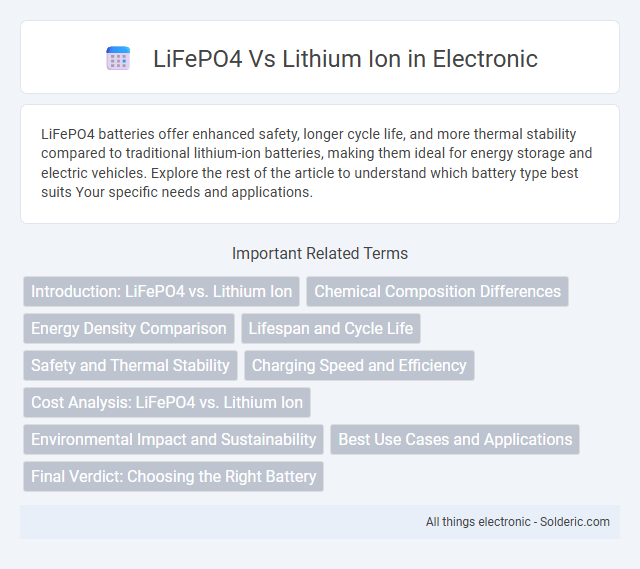LiFePO4 batteries offer enhanced safety, longer cycle life, and more thermal stability compared to traditional lithium-ion batteries, making them ideal for energy storage and electric vehicles. Explore the rest of the article to understand which battery type best suits Your specific needs and applications.
Comparison Table
| Feature | LiFePO4 (Lithium Iron Phosphate) | Lithium-Ion |
|---|---|---|
| Energy Density | 90-120 Wh/kg | 150-200 Wh/kg |
| Cycle Life | 2000-5000 cycles | 500-1000 cycles |
| Safety | High thermal and chemical stability, less prone to fire | Lower thermal stability, higher risk of overheating and fire |
| Cost | Higher upfront cost but longer lifespan | Lower initial cost, shorter lifespan |
| Applications | Electric vehicles, solar energy storage, power tools | Consumer electronics, electric vehicles, portable devices |
| Operating Temperature | -20degC to 60degC | -20degC to 60degC (varies by chemistry) |
| Charge Rate | Moderate (0.5C to 1C) | Higher (up to 3C depending on chemistry) |
Introduction: LiFePO4 vs. Lithium Ion
LiFePO4 batteries offer enhanced thermal stability and longer cycle life compared to traditional lithium-ion batteries, making them ideal for applications requiring safety and longevity. These batteries provide a more stable chemistry with lower risk of overheating, while lithium-ion batteries typically have higher energy density and lighter weight. Your choice between LiFePO4 and lithium-ion will depend on whether you prioritize safety and durability or maximum energy capacity and compactness.
Chemical Composition Differences
LiFePO4 batteries use lithium iron phosphate as the cathode material, offering improved thermal stability and longer cycle life compared to traditional lithium-ion batteries that typically use lithium cobalt oxide or lithium manganese oxide. The distinct chemical composition of LiFePO4 results in safer operation with lower risk of thermal runaway, while lithium-ion batteries generally provide higher energy density. Understanding these chemical composition differences helps you choose the right battery type for applications requiring enhanced safety or higher capacity.
Energy Density Comparison
LiFePO4 batteries typically have a lower energy density, around 90-160 Wh/kg, compared to lithium-ion batteries, which range between 150-250 Wh/kg, making lithium-ion cells more suitable for applications needing lighter and more compact power sources. Despite their lower energy density, LiFePO4 batteries offer superior thermal stability, longer cycle life, and enhanced safety, which benefits your energy storage solutions when reliability and durability are critical. Choosing between LiFePO4 and lithium-ion depends on whether your priority is higher energy density for portability or robust performance and safety.
Lifespan and Cycle Life
LiFePO4 batteries offer a significantly longer lifespan, often reaching 2,000 to 5,000 charge-discharge cycles compared to lithium-ion batteries, which typically last around 500 to 1,500 cycles. The enhanced cycle life of LiFePO4 is due to its stable chemical structure, which reduces capacity degradation over time. This makes LiFePO4 cells more suitable for demanding applications requiring extended durability and reliability.
Safety and Thermal Stability
LiFePO4 batteries offer superior safety and thermal stability compared to traditional lithium-ion cells due to their stable olivine structure, which reduces the risk of thermal runaway and fire hazards. Their higher thermal tolerance allows operation within a broader temperature range, maintaining performance without degradation or swelling. This makes LiFePO4 a preferred choice for applications requiring enhanced safety and long-term reliability under demanding thermal conditions.
Charging Speed and Efficiency
LiFePO4 batteries offer slower charging speeds compared to traditional lithium-ion batteries due to their stable chemistry, but they provide higher charging efficiency with minimal heat generation and longer cycle life. Lithium-ion batteries charge faster, making them ideal for applications requiring quick energy replenishment, yet they tend to lose efficiency over time due to heat buildup and degradation. For your needs, choosing LiFePO4 can ensure safer, more efficient charging with enhanced battery longevity, while lithium-ion optimizes speed at the potential cost of reduced lifespan.
Cost Analysis: LiFePO4 vs. Lithium Ion
LiFePO4 batteries generally offer a lower cost per cycle compared to traditional lithium-ion batteries, making them more cost-effective for long-term use despite a higher upfront price. Their enhanced thermal stability and longer lifespan reduce replacement frequency, translating into savings on maintenance and downtime. When evaluating your energy storage investment, LiFePO4 provides a compelling balance of durability and cost-efficiency that can outperform lithium-ion in large-scale or frequently cycled applications.
Environmental Impact and Sustainability
LiFePO4 batteries offer a significantly lower environmental impact compared to traditional lithium-ion batteries due to their use of abundant, non-toxic materials and increased recyclability. Their longer cycle life reduces waste and resource consumption, enhancing overall sustainability in energy storage solutions. Choosing LiFePO4 for your applications supports greener technology with fewer hazardous byproducts and a smaller carbon footprint.
Best Use Cases and Applications
LiFePO4 batteries excel in applications requiring enhanced safety, long cycle life, and thermal stability, making them ideal for electric vehicles, solar energy storage, and portable medical devices. Lithium-ion batteries, with higher energy density and lightweight design, suit smartphones, laptops, and aerospace applications where space and weight are critical. Your choice depends on balancing power needs, safety requirements, and operational lifespan for the specific use case.
Final Verdict: Choosing the Right Battery
LiFePO4 batteries offer superior safety, longer cycle life, and thermal stability compared to traditional lithium-ion batteries, making them ideal for applications requiring high durability and consistent performance. Lithium-ion batteries provide higher energy density and lighter weight, suited for portable electronics and electric vehicles where space and weight are critical factors. Selecting the right battery depends on the specific requirements of energy capacity, safety, weight considerations, and long-term reliability in the intended usage scenario.
LiFePO4 vs lithium ion Infographic

 solderic.com
solderic.com